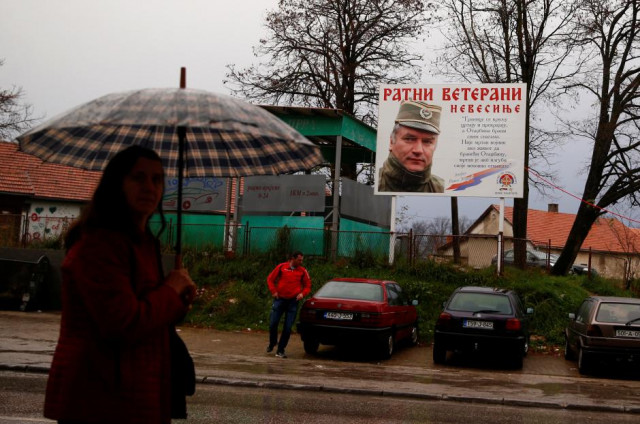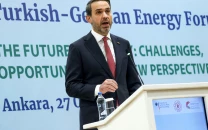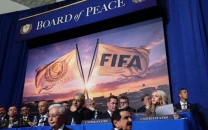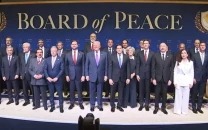Clamour for justice: Yugoslav court leaves global legacy
ICC tribunal demonstrates that rulers can be brought to justice

A placard depicting former Bosnian Serb general Ratko Mladic is seen in Nevesinje, Bosnia and Herzegovina. PHOTO: REUTERS
The International Criminal Tribunal for the former Yugoslavia (ICTY), set up by the United Nations in 1993, marked the biggest leap in the field of international criminal law since the Allies tried the Nazis in Nuremberg.
Created in answer to the worst war crimes in Europe since World War Two, it set a precedent of accountability that has since put the Khmer Rouge and Liberia's Charles Taylor in the dock and paved the way for a court with global ambition.
Almost 25 years later, its legacy is under threat.
The International Criminal Court (ICC), opened in 2002, is undermined by renewed West-Russia rivalry, stone-walling and revolt in Africa, barrel bombs in Syria and a boycott by three of five permanent members of the UN Security Council.
Supporters of the Yugoslav tribunal say it will remain a beacon inspiring a growing demand for justice and creativeness in delivering it - from ad hoc tribunals in Africa to the conviction in one country of a dictator from another and that of a Syrian in Sweden after a post on Facebook.
Karadzic found guilty of genocide, jailed for 40 years
The glass is either half full or half empty, said Alex Whiting, professor of practice at Harvard Law School. "You can say we haven't come far enough and the new institutions, particularly the ICC, have not replicated the success of the ICTY, but you can just as easily say it's remarkable how far we've come in just 25 years," he said. "The ICTY is the North Star."
'Rulings will write history'
The Yugoslav tribunal owes a debt to history, born as it was between the end of the Cold War and the 9/11 attacks on the United States, when Russia was weak and the West was united in collective action.
For decades before, conflicts from Vietnam to Algeria, Afghanistan to Sri Lanka escaped major judicial scrutiny. Backed by the arrest-power of Western peacekeepers and the readiness of the European Union to condition integration with Yugoslavia's successor states on their cooperation, the tribunal issued 161 indictments and secured 83 convictions.
Wednesday's verdict in the trial of Bosnian Serb wartime commander Ratko Mladic will be its last, bar appeals. The Yugoslav court was the first to indict a sitting head of state in Serbia's Slobodan Milosevic, recognised sexual violence as a crime of war and advanced the definition of genocide.
With the UN tribunal for Rwanda, it assembled the hybrid case law used by tribunals in Sierra Leone, Cambodia, Lebanon and ultimately the ICC. Its 2.5 million pages of transcripts offer a forensic and often harrowing account of a state's dissolution that dispels the fog of wartime propaganda. More than 4,500 witnesses took the stand.
"I committed myself to speak on behalf of those who did not survive," said Nusreta Sivac, a former judge in Bosnia who testified to her rape by Bosnian Serb captors. "The tribunal rulings will write history."
Detractors say the court was slow, expensive and damaged by a number of high-profile acquittals. Milosevic died in 2006 while still on trial, while some cases were plagued by witness intimidation. The tribunal was supposed to help with reconciliation, but revisionism is rife and convicted war criminals often feted as heroes.
Critics argue the indictment of Milosevic, at the height of NATO air strikes against him, only complicated the conflict and encouraged him to cling on, which he did for another 17 months. Similar arguments have been made against the ICC's pursuit of some African leaders.
Karadzic war crimes trial witness details horrors
Insurmountable obstacles
Established by treaty and boycotted by the United States, China and Russia, the ICC has little of the clout of the ICTY. With only one Arab member, it has found the bulk of its work in Africa.
Alleging bias, Burundi quit the court last month. Kenya and South Africa have threatened to follow. The court's credibility has already been tested by the collapse in 2014 of a case against Kenyan President Uhuru Kenyatta and Sudanese President Omar al-Bashir's eight-year evasion of arrest.
Most glaring is its impotence in the face of nearly half a million dead in Syria, its hands tied by Russian and Chinese vetoes in the Security Council, which can refer a case to the court in a non-member state such as Syria.
The ICC denies any bias against Africa and is at various stages of investigation in Georgia, Iraq, Ukraine, Colombia and Palestine, though it can expect to make little progress in investigating conflicts involving Russia or the United States.
In a watershed moment, prosecutors this month called for a formal investigation into war crimes in Afghanistan, including the mistreatment of detainees by US forces in the country and at CIA 'dark sites' in Poland, Romania and Lithuania.
Experts say the move is symbolic of the court's ambition, but also of its limitations, given the unlikelihood of any cooperation from the Trump administration.
The Yugoslav tribunal demonstrated that, "with strong political and diplomatic support from the international community, justice can be achieved", its chief prosecutor Serge Brammertz told Reuters.
"But without that support, the obstacles can be almost insurmountable." Kevin Jon Heller, law professor at the University of Amsterdam, said of the ICC: "I strongly doubt it is ever going to fulfil the aspirations of the people in the states that created it."
Expectation of action
Nevertheless, demands for accountability are multiplying, along with avenues to pursue them.
Experts point to the 2016 conviction of Chad ex-dictator, Hissene Habre, in a Senegalese court, the first time universal jurisdiction was used to prosecute the former ruler of one country by a court in another for human rights crimes.
'Mission accomplished' for UN war crimes court?
The same principle saw a Syrian soldier convicted by a Swedish court last month, partly on the basis of social media posts, while authorities in Sweden and Germany are each investigating more than a dozen individuals for crimes in Syria and Iraq.
With the Security Council paralysed, the UN General Assembly has launched its own ad hoc mechanism to investigate war crimes in Syria.
A hybrid tribunal is in the works in Central African Republic and another mooted for South Sudan.
"What has not ebbed in the last five to seven years, and in fact what has only increased, is the demand for justice, and an expectation that it will translate into action," said Param-Preet Singh, an associate director at Human Rights Watch.
The ICTY and efforts since have "changed the conversation", said Whiting. "It is for that reason this project will never die," he said. "It will go into dormancy, but it will never die."



















COMMENTS
Comments are moderated and generally will be posted if they are on-topic and not abusive.
For more information, please see our Comments FAQ